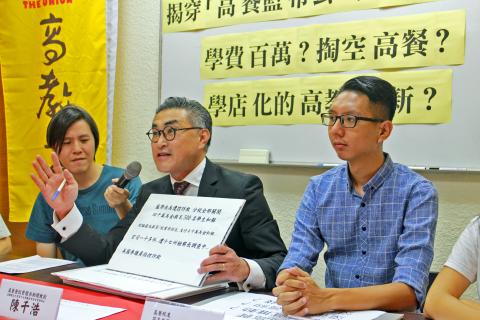Plans by National Kaohsiung University of Hospitality and Tourism and French culinary institute Le Cordon Bleu to cooperate would misuse public land and resources to fund an elitist “cram school,” union activists said yesterday.
“This is a crucial case because the Ministry of Education has always hoped to bring foreign schools into Taiwan and they have now sacrificed tuition restrictions,” Taiwan Higher Education Union organization department director Lin Po-yi (林柏儀) said, adding that the move would encourage other schools to sign similar deals, undercutting the public nature of education as schools take advantage of the situation to raise tuition fees.
As many schools are struggling financially amid falling student numbers, private sector cooperation plans that would bring in additional revenue have become a source of contention, with the union contending that many of the schemes would encourage private “rent-seeking” to take unfair advantage of schools’ public resources and funding.

Photo courtesy of the Taiwan Higher Education Union
The contract is for the university and Le Cordon Bleu to establish a for-profit institute in a refurbished university building, stipulating tuition fees of more than NT$1 million (US$30,670) for a 15-month program.
Yearly tuition for universities in Taiwan range from about NT$60,000 to NT$100,000.
Lin said the university should stop admitting people to the joint venture until a full review of the Ministry of Education’s approval is conducted, citing the illegality of the school’s plans to hire foreign teachers when approval occurred.
For-profit schools were only allowed to hire foreigners to teach foreign languages prior to a special regulation exception passed by Ministry of Labor earlier this week, which allows foreigners to teach culinary arts.
The “tailored” amendment was unnecessary, given the existing ability of public and private non-profit universities to hire foreign instructors directly, Lin said.
“This amendment was designed to get Le Cordon Bleu out of a pinch — not to protect the labor rights of foreigners,” he said. “Even though they will charge extremely high tuition fees, they actually only intend to bring in two foreign instructors.”
The new institute intends to admit 64 students starting next month.
The university has also been criticized for sacrificing one of its buildings for the institute.
“The building was constructed with government funding, but our students will not be able to use it,” Chen Chien-hao (陳千浩), an assistant professor at the university said, adding that the institute pushed out the original student cafeteria, which was forced to move to a basement.
“It would not be such a big deal if we were dealing with Harvard — but this a diploma mill,” he said, citing legal controversy forcing the closure of Le Cordon Bleu schools in the US.
Wang Ying-shun (王映舜) — a former deputy student council president at the Kaohsiung university — said that promises to allow regular students to intern at the institute were “flimsy” as there would likely be just one or two openings available given its small class size.
Interns would also likely be responsible for helping out with “odds and ends” rather than being allowed meaningful participation, Wang said.

ANOTHER EMERGES: The CWA yesterday said this year’s fourth storm of the typhoon season had formed in the South China Sea, but was not expected to affect Taiwan Tropical Storm Gaemi has intensified slightly as it heads toward Taiwan, where it is expected to affect the country in the coming days, the Central Weather Administration (CWA) said yesterday. As of 8am yesterday, the 120km-radius storm was 800km southeast of Oluanpi (鵝鑾鼻), Taiwan’s southernmost tip, moving at 9kph northwest, the agency said. A sea warning for Gaemi could be issued tonight at the earliest, it said, adding that the storm is projected to be closest to Taiwan on Wednesday or Thursday. Gaemi’s potential effect on Taiwan remains unclear, as that would depend on its direction, radius and intensity, forecasters said. Former Weather Forecast

As COVID-19 cases in Japan have been increasing for 10 consecutive weeks, people should get vaccinated before visiting the nation, the Centers for Disease Control (CDC) said. The centers reported 773 hospitalizations and 124 deaths related to COVID-19 in Taiwan last week. CDC Epidemic Intelligence Center Director Guo Hung-wei (郭宏偉) on Tuesday said the number of weekly COVID-19 cases reported in Japan has been increasing since mid-May and surpassed 55,000 cases from July 8 to July 14. The average number of COVID-19 patients at Japan’s healthcare facilities that week was also 1.39 times that of the week before and KP.3 is the dominant

The Chinese Communist Party’s (CCP) working group for Taiwan-related policies is likely to be upgraded to a committee-level body, a report commissioned by the Mainland Affairs Council (MAC) said. As Chinese President Xi Jinping (習近平) is increasingly likely to upgrade the CCP’s Central Leading Group for Taiwan Affairs, Taiwanese authorities should prepare by researching Xi and the CCP, the report said. At the third plenary session of the 20th Central Committee of the CCP, which ended on Thursday last week, the party set a target of 2029 for the completion of some tasks, meaning that Xi is likely preparing to

US-CHINA TRADE DISPUTE: Despite Beijing’s offer of preferential treatment, the lure of China has dimmed as Taiwanese and international investors move out Japan and the US have become the favored destinations for Taiwanese graduates as China’s attraction has waned over the years, the Ministry of Labor said. According to the ministry’s latest income and employment advisory published this month, 3,215 Taiwanese university graduates from the class of 2020 went to Japan, surpassing for the first time the 2,881 graduates who went to China. A total of 2,300 graduates from the class of 2021 went to the US, compared with the 2,262 who went to China, the document showed. The trend continued for the class of 2023, of whom 1,460 went to Japan, 1,334 went to